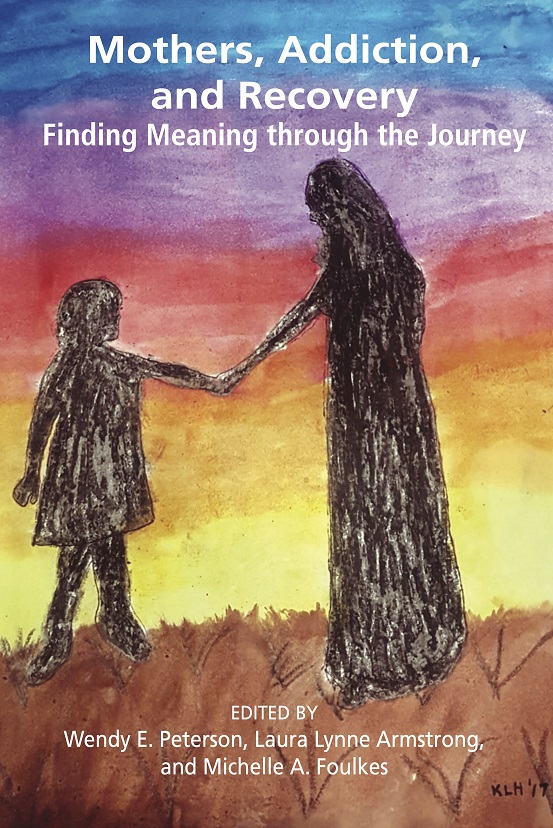
Price: $34.95
Page Count: 252
Publication Date: July 2018
ISBN: 978-1-77258-168-3
This anthology is a collection of personal accounts, research, treatment approaches and policy commentary exploring women’s experiences of mothering in the context of addiction. Individual chapters focus on a variety of addictions during pregnancy or mothering including misuse of substances, food and smartphones. A central theme of the book is the meaning of women’s maternal identity as key to recovery. Part I focusses on women’s lived experiences of mothering through their addiction and recovery. The chapters in part II report findings from studies that have prioritized the perspective of mothers living with addiction. In Part III of this collection, we expand our view of addiction and turn to approaches for supporting mothers of daughters with eating disorders and prevention of smartphone addiction. In part IV, contributors expand on the themes of harm reduction and restorative, healing approaches to the treatment of mothers’ addictions that have echoed throughout the chapters of this book. The anthology concludes with a gendered analysis and critique of addiction programs and policy.
“Mothers, Addiction and Recovery: Finding Meaning Through the Journey is a timely and innovative book, which provides a significant exploration of the topic of addiction. The book effectively highlights mothers’ unique experiences of addiction from their own voices, provides a comprehensive overview of current scholarly research and theorization on addiction, and offers a critical discussion of addiction treatment and recovery programs and practices. The authors provide invaluable insight into the various ways that women mother in the context of addiction, the challenges and struggles they encounter, and the strengths and capacities they demonstrate despite the difficulties and stigmatizations that they face. This book should be read by policy makers, academics, service providers, the wider general public, and anyone who seeks to gain a greater understanding of the unique experience of mothering in the context of addiction.”
—CAROLINE MCDONALD-HARKER, Professor, Department of Sociology & Anthropology, Mount Royal University, Calgary, Alberta
“This book addresses the topic of motherhood and addiction and clearly articulates that there are many different roads to recovery. The inclusion of lived experience is important as well as the need for non punitive approaches and access to programs where both women and their infants/children may attend. This would be a valuable book for anyone considering working in the field of addictions as childbearing women will make up at least half their practice.”
—SARAH PAYNE, Retired Senior Practice Leader, Perinatal Addictions, BC Women’s Hospital
Acknowledgments
Introduction
Wendy E. Peterson, Laura Lynne Armstrong, and Michelle Foulkes
PART I: LIVED EXPERIENCE: MOTHERS, ADDICTION, AND RECOVERY
Cholera Germs and Hummingbirds: A Spiritual Journey toward Recovery from Posttraumatic Stress Disorder and Addiction
Patricia P. Brethour
From Winter to Summer
Renée Violette
Obesity and Recovering through Motherhood
Hadley Ajana
Mothering Through Addiction and Jail
Chandera von Weller, Joni Joplin, Sam Pecchio, Tobi Jacobi,
Kate Miller, and Larissa Willkomm
PART II: RESEARCH WITH MOTHERS
A Comparison of Justice-Involved and Nonjustice-Involved Mothers
Erika Kates
Mothering and Mentoring: The PCAP Women’s Quilt
Dorothy Badry, Kristin Bonot, and Rhonda Nelson
Mothering an Adolescent Who Misuses Substances: A Qualitative Evidence Synthesis Masoumeh (Bita) Katouziyan, Amanda Vandyk, and J. Craig Phillips
PART III: PREVENTION AND TREATMENT APPROACHES FOR MOTHERS LIVING WITH ADDICTION
Confronting the Addictive Nature of Eating Disorder Behaviours: How Mothers Can Provide Support to Daughters with Eating Disorders through
a Meaning-Centred Framework
Caitlin Sigg and Laura Lynne Armstrong
REAL Education to Prevent Smartphone Addiction:
A Rational-Emotive, Attachment Logotherapy Approach for Expectant Mothers
Laura Lynne Armstrong
PART IV: RETHINKING PRACTICE AND POLICY
Beyond Abstinence:
Harm Reduction during Pregnancy and Early Parenting Lenora Marcellus, Nancy Poole, and Natalie Hemsing
Mothering and Illicit Substance Use:
A Critical Analysis of the Implications for Healthcare and Social Policy Development from a Feminist Poststructuralist Perspective Michelle Foulkes
Concluding Thoughts
Wendy E. Peterson, Laura Lynne Armstrong, and Michelle Foulkes
About the Contributors
Wendy E. Peterson RN, PhD. is an Associate Professor at the School of Nursing, Faculty of Health Sciences, University of Ottawa. Her program of research aims to improve the quality and experience of maternal-newborn health services for marginalized women by addressing disparities in access to health services, facilitating woman-centered humanistic birth, and critically examining the role of registered nurses in interprofessional maternal-newborn health care teams.
Laura Lynne Armstrong, Ph.D., C.Psych. is an Assistant Professor, Clinical Psychologist, and researcher at Saint Paul University. She also holds a Diplomate Clinician certification in Logotherapy from the Viktor Frankl Institute of Logotherapy. She is the founder of R.E.A.L. therapy (Rational-Emotive Attachment Logotherapy) and a resilience-based mental health promotion program for school children, called D.R.E.A.M. (Developing Resilience through Emotions, Attitudes, and Meaning). In addition to public presentations to enhance community mental health, Dr. Armstrong works clinically with children, youth, and adults.
Michelle A. Foulkes NP-PHC, PhD. Michelle is a primary health care nurse practitioner and has worked in a variety of nursing contexts over the last 29 years. Her research and clinical interests reside in women’s mental health and addictions across the lifespan, social justice, health policy and integration of the nurse practitioner role in Canadian health care. She completed her PhD in nursing in 2015 with her thesis work focused on prenatal attachment in women with addictions.


